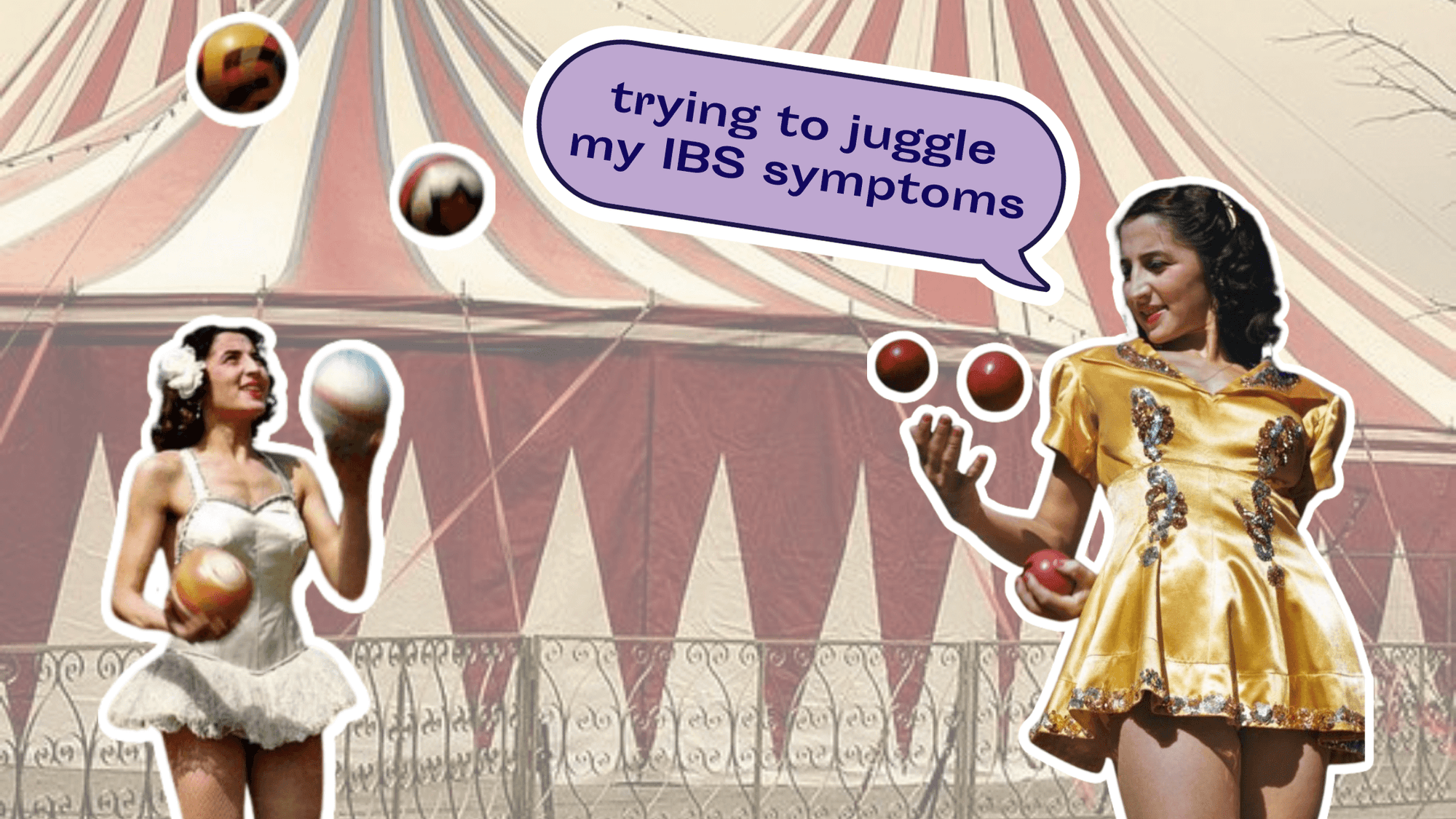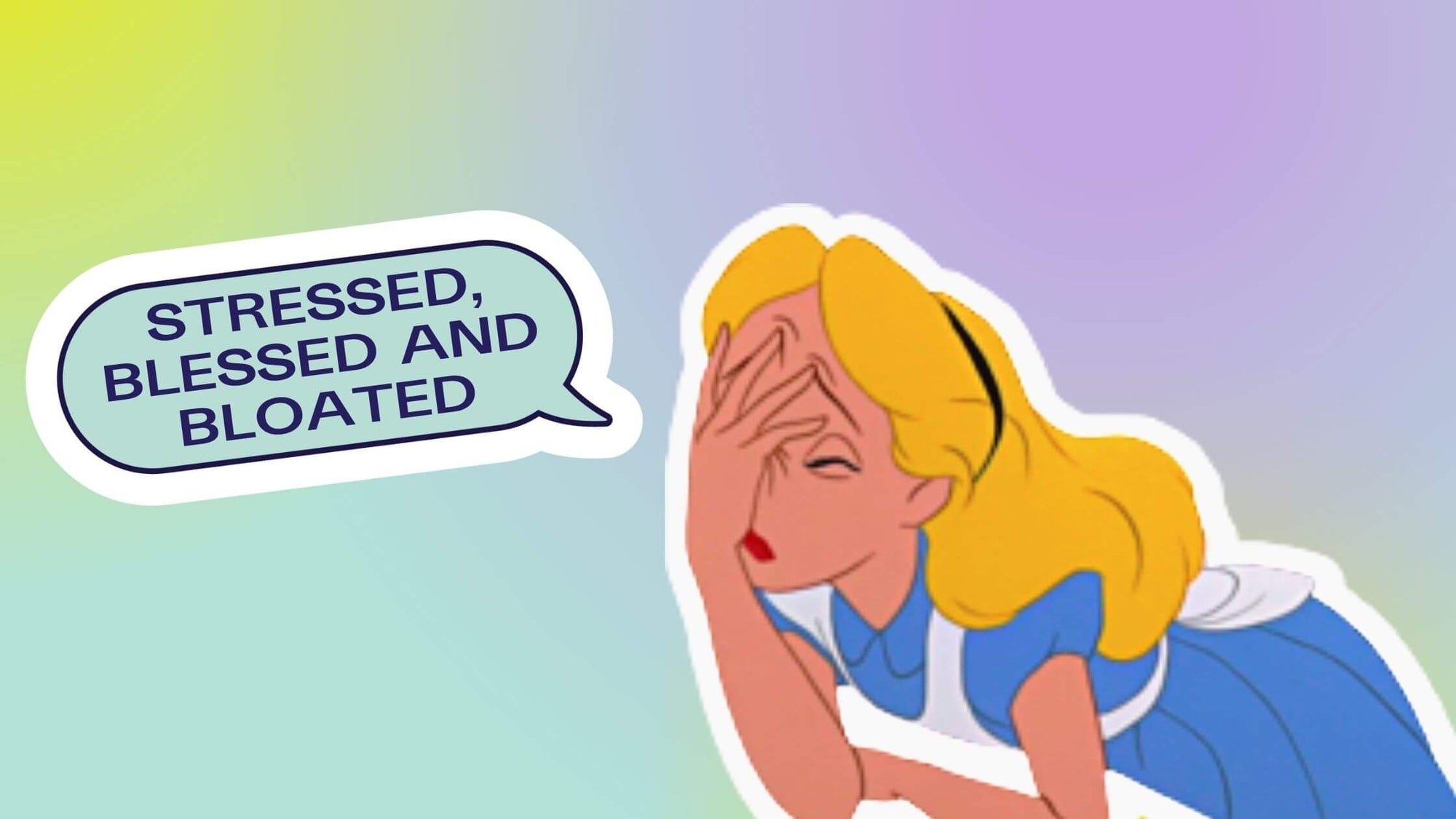Bloating is a relatively common symptom to experience when you’re on your period. Many women complain of feeling gassy, swollen, and tight around their abdomen when they’re menstruating.
Usually, period bloating appears a few days before you start bleeding and disappears one or two days into menstruation. It can be uncomfortable and even painful at times and while you may not be able to completely eliminate period bloating, there are things that you can do to reduce its severity.
Let’s take a closer look at what period bloating is, how it is caused, what its main symptoms are, and what you can do to tackle this issue each month.
What Is Period Bloating?
Bloating is a common symptom of hormonal changes that occur during the reproductive cycle. More specifically, many women experience bloating and abdominal discomfort in the second half of their cycle.
The second half of the menstrual cycle is called the luteal phase, and this refers to the time period after ovulation all the way up to menstruation (your period). Usually, a healthy luteal phase is between 12 and 14 days, although some women can have short luteal phases if they’re stressed or have underlying hormonal imbalances.
The increased prevalence of bloating in the luteal phase is largely due to fluctuations in oestrogen and progesterone, two of the key reproductive hormones that regulate the menstrual cycle.
How does period bloating happen?
Oestrogen and progesterone cause changes in fluid and salt retention in the body. They can cause the body to hold onto more water in all areas of the body, including the digestive tract.
With extra water in the gastrointestinal tract, you’re more likely to experience bloating, gas, and abdominal discomfort. Depending on how rapidly your hormones fluctuate and whether you have any hormonal imbalances going on, you might get severe bloating.
You might experience bloating after ovulation and continue with it into your period. You can thank progesterone for this! However, the drop in oestrogen in the luteal phase is also to blame for increased water retention and digestive symptoms.
Progesterone can also slow down the contractions of the intestines, leading to constipation and bloating. The release of prostaglandins during menstruation can contribute to bloating by causing the muscles in the intestines to contract more strongly, causing cramps and even pain.
Dietary and lifestyle factors can also contribute to digestive issues. Consuming high-salt, high-sugar, or high-fat foods can increase inflammation and water retention, worsening bloating. Similarly, inadequate consumption of fibre or water can increase hormonal bloating.
Having caffeinated drinks can worsen muscle contractions and cramps around menstruation. Lack of physical activity can also contribute to digestive symptoms during the menstrual cycle. Although it’s generally recommended to avoid high-intensity movement during your period, gentle exercise can be beneficial to keep things moving through your digestive tract.
It's important to note that period bloating varies from person to person. Some individuals may experience it more severely than others, even if they follow the exact same diet and lifestyle.
What Are the Symptoms of Period Bloating?
Symptoms of period bloat can appear up to two weeks before you actually start bleeding. The exact symptoms can vary from person to person, as can the severity, but general bloating is normal around menstruation.
Generally, period bloating symptoms include:
1. Abdominal distension
A feeling of fullness, tightness, and discomfort in the lower abdomen.
2. Water retention
Bloating is often associated with increased water retention in the digestive tract, as well as in the hands, feet, and face, leading to swelling and puffiness.
3. Abdominal cramps
A lot of women experience cramping in their lower abdomen around menstruation, and it can range from mild to severe. Note that severe cramps are not normal or healthy, and you should speak to a specialist doctor if you’re experiencing debilitating cramps on your period!
4. Temporary weight gain
Excess water and gas in the body lead to a temporary increase in body weight. When your bloating subsides, your weight will return to normal.
5. Excess gas
Some women feel gassy around their period, leading to bloating and excessive flatulence.
6. Constipation or diarrhoea
The hormonal changes that occur during the menstrual cycle can increase or decrease the muscle contractions of the gastrointestinal tract, leading to changes in bowel habits. You might be constipation or have diarrhoea, depending on the way your hormones impact your body.
7. PMS symptoms
Alongside period bloating, you might also experience mood changes, tender or painful breasts, fatigue, headaches, and hot flashes. Again, you can thank your sex hormones for this!
How Can You Reduce Period Bloating?
Bloating is one of the most common symptoms associated with the lead-up to the menstruation phase of the menstrual cycle, but that doesn’t mean you need to suffer for several days every month!
Check out these top ways to reduce period bloating or potentially eliminate it altogether.
1. Choose low-sodium, high-potassium foods
The foods you eat leading up to and during your period can impact how much bloating you experience. This is because certain foods and nutrients affect your gut motility and the water balance in your body.
It’s important to avoid high-sodium foods if you’re prone to bloating. Foods that are abundant in sodium can increase water retention in your gastrointestinal tract, worsening your bloating.
Instead, try to choose foods that are high in potassium. This will counteract the effects of sodium by reducing water retention and increasing water loss. Potassium is abundant in avocados, bananas, dried fruit, lentils, and potatoes.
2. Take Magnesium
Magnesium can also counteract sodium balances, and reduce water retention - that feeling of "puffiness". Studies have shown that magnesium can reduce breast tenderness, headaches, water retention, cramps and bloating during the menstrual cycle.
3. Avoid gas-producing foods and drinks
Bloating is worsened by the consumption of gas-producing foods and drinks, such as:
- Fruits that are high in sugar, such as bananas, pears, and apples
- Cruciferous vegetables
- Beans
- Legumes
- Fermented foods
- Protein powder supplements
- Sodas
- Fruit juice
- Sparkling water
- Energy drinks
Gas-producing foods contribute to bloating and can cause abdominal discomfort if eaten in large amounts. The best way to cut down the severity of the frequency of bloating is to avoid the above foods as much as you can.
4. Eat smaller, more frequent meals
It might sound like a relatively obvious way to reduce bloating on your period but try sticking to smaller, more frequent meals over larger, less frequent meals. Doing so gives your digestive system more time to fully break down the foods that you're eating, reducing the risk of bloating.
5. Stay hydrated
Water is essential for your digestion, and staying hydrated is one of the best ways to prevent constipation and bloating. Drinking plenty of water increases gut motility and supports your body's natural digestive processes for efficient digestion.
Aim to drink around eight glasses of water a day, and perhaps even more while you're on the period. If you exercise while you're menstruating or you have a physically demanding job, you will probably need to drink more than this.
6. Avoid caffeine and alcohol
Both caffeine and alcohol can irritate the digestive tract when you're on your period so if you're able to resist your morning cup of coffee or your evening glass of wine, it's best to do so when you're menstruating!
Caffeine can increase the severity and frequency of period cramps and other symptoms of pre-menstrual syndrome (PMS) because of its inflammatory effects. Alcohol is a diuretic that increases water loss through urination, so it can cause you to become dehydrated. This is especially the case during your luteal phase (the phase between ovulation and your period) where your body needs more water.
7. Keep up with daily exercise
It can be difficult to keep up with your usual exercise routine when you're on your period. If, like many women, you feel fatigued, unmotivated, and a little dizzy on your period, a high-intensity workout is the last thing you want to do. However, staying physically active during your period can minimise bloating.
You don't need to go to the gym for hours every day during your period. You don't even need to do anything high-intensity if you don't feel like it. Simply walking for 20-30 minutes a day while you're menstruating can be enough to maintain great gut motility and prevent bloating.
8. Take a probiotic
Probiotics are live bacteria that are known to be beneficial for digestion. They can be found naturally in fermented foods and drinks, like yoghurt, sauerkraut, tempeh, kefir, and kombucha. You can also find lots of great probiotic supplements on the market that contain millions of live bacteria to support your gut health and digestion. Most probiotic supplements are tablets or capsules that you swallow.
If you choose to take a probiotic supplement to help with period bloating, make sure it contains at least 1,000,000 CFU (colony forming units) per gram of product. This is the recommended threshold for a probiotic to be effective.
Probiotic bacteria, such as Lactobacillus and Bifidobacterium (the ones we use in Wild Dose!) are found naturally in a healthy human gut and they are responsible for supporting the breakdown of food.
They also boost immune function by preventing harmful pathogens from entering your bloodstream from your digestive tract. Some research suggests that beneficial gut microbes also play a crucial role in mental health, thanks to the gut-brain connection.
9. Take digestive enzymes
Your body produces digestive enzymes endogenously and these enzymes help to break down the food that you eat. If you're prone to period bloating, you might benefit from taking digestive enzyme supplements to support your endogenous enzymes.
Taking a digestive enzyme supplement enables you to metabolise foods into smaller molecules that can be easily absorbed into the bloodstream through the intestinal wall. Quicker metabolism of food reduces the risk and severity of bloating on your period, helping you to feel comfortable and less gassy.
10. Drink herbal tea
If you're a hot drink lover, you might have been gutted to hear that caffeine isn't the best for you when you're on your period. But this doesn't mean that you can't still enjoy a lovely hot drink! If anything, hot drinks can be soothing when you're on your period, and they can make you feel calmer.
To avoid caffeine while still satisfying your hot drink-loving self, try herbal tea instead of coffee. Most herbal teas contain little to no caffeine but provide a number of beneficial compounds, such as vitamins, minerals, and antioxidants, that boost your general health.
Herbal teas come in a range of flavours, including ginger, lemon, peppermint, and more. Many herbal tea ingredients are known to reduce inflammation and minimise muscle cramps, making them the perfect addition to your diet during your period.









